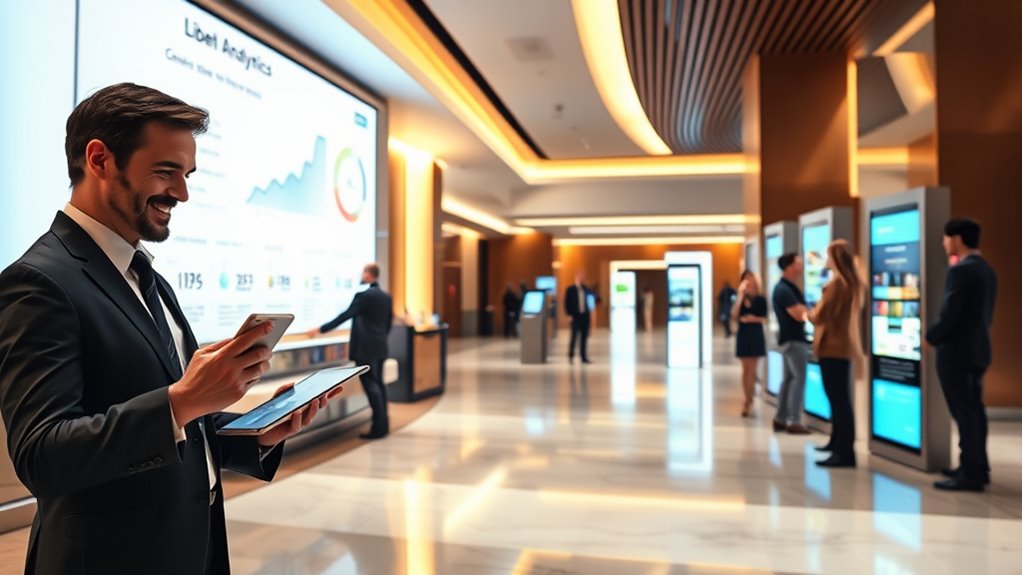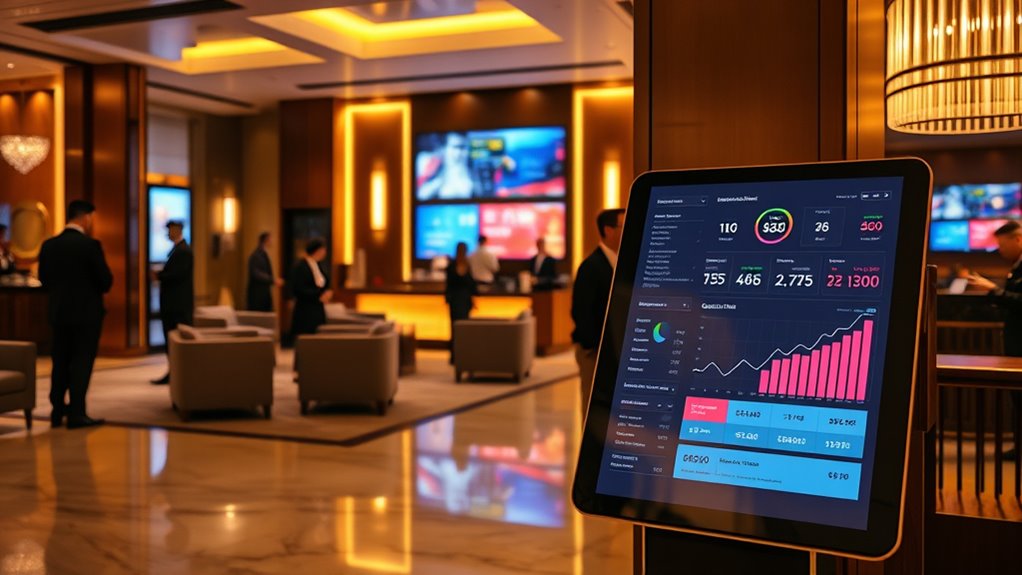Data-driven guest experience platforms help you personalize services, streamline operations, and boost guest satisfaction through real-time analytics and integrated systems. They collect customer preferences, behaviors, and feedback from various sources, allowing you to tailor interactions and anticipate needs effectively. By leveraging automation and advanced tools, you can create memorable, seamless experiences while ensuring data privacy. Want to discover how these platforms can transform your hospitality business? Keep exploring to find out more.
Key Takeaways
- Integrate guest data from multiple sources for personalized, seamless interactions across all touchpoints.
- Utilize real-time analytics and engagement tools to tailor services and respond proactively to guest needs.
- Employ automation and AI-driven platforms to streamline operations, enhance efficiency, and improve guest satisfaction.
- Prioritize data security through encryption, compliance, and staff training to protect guest privacy.
- Leverage predictive insights and emerging technologies like IoT and AR to create immersive, personalized guest experiences.
Understanding the Role of Data in Modern Hospitality

Data has become the backbone of modern hospitality, enabling you to better understand and serve your guests. When you harness data effectively, you gain insights into guest preferences, behaviors, and expectations. This allows you to personalize experiences, anticipate needs, and address issues proactively. By analyzing booking patterns, feedback, and social media activity, you can identify trends and tailor your offerings accordingly. Data-driven decisions help you optimize operations, improve customer satisfaction, and foster loyalty. Instead of relying solely on intuition, you use concrete information to enhance every touchpoint. This shift not only streamlines your processes but also creates a more memorable, customized experience for each guest. Ultimately, understanding and leveraging data empowers you to stay competitive in a rapidly evolving industry.
Key Components of a Guest Experience Platform

To create an exceptional guest experience, your platform needs key components that work together seamlessly. Personalization engines tailor services to each guest, while real-time analytics provide instant insights to enhance interactions. Seamless integration ensures all systems communicate smoothly, making the entire experience more efficient and engaging.
Personalization Engines
Have you ever wondered how guest experience platforms tailor interactions to each individual? This is where personalization engines come in. They analyze data about your preferences, behaviors, and history to craft customized experiences. These engines use algorithms that identify patterns and predict what you might want next. For example, they might recommend a dining option based on past choices or suggest a room upgrade aligned with your loyalty tier. By continuously learning from your interactions, personalization engines guarantee that every touchpoint feels relevant and engaging. They integrate seamlessly with other platform components, delivering tailored content across channels. The goal is to create a seamless, memorable experience that makes you feel understood and valued, ultimately fostering loyalty and satisfaction. Additionally, understanding the benefits of eye patches can be useful for personal care routines that enhance overall well-being, which can indirectly contribute to a more positive guest experience.
Real-Time Analytics
Ever wonder how guest experience platforms respond instantly to your needs? It’s thanks to real-time analytics. These systems continuously collect data from your interactions, preferences, and behaviors. As soon as you engage with a service or provide feedback, the platform processes this information instantly. This allows it to identify patterns, detect issues, and predict your next move. With real-time analytics, your experience is dynamic and personalized, adapting on the fly. Whether it’s adjusting room settings, offering tailored recommendations, or resolving problems quickly, this component ensures your journey feels seamless. It transforms raw data into actionable insights in seconds, enabling the platform to respond swiftly and accurately. This immediacy enhances satisfaction, making every interaction more relevant and efficient. Additionally, the use of personalization algorithms ensures that your unique preferences are prioritized, further elevating your overall experience.
Seamless Integration
Building on real-time analytics, seamless integration guarantees that all components of a guest experience platform work together smoothly, creating a unified experience. When your systems communicate effortlessly, guests enjoy personalized services without interruptions. Key integrations include property management systems, booking engines, and communication tools. These connections ensure data flows seamlessly, reducing errors and delays. To visualize, consider this table:
| Component | Function | Benefit |
|---|---|---|
| PMS (Property Management System) | Manages guest info and reservations | Accurate data, smooth check-in |
| Communication Platforms | Sends personalized messages | Enhances guest engagement |
| Booking Engines | Handles reservations online | Simplifies booking process |
Together, these integrations form a cohesive, efficient platform that elevates guest experiences and operational efficiency. Seamless communication between components further enhances overall service quality.
Collecting and Integrating Guest Data Effectively

To collect and integrate guest data effectively, you need a streamlined process that captures accurate information and consolidates it across various touchpoints. Start by implementing unified data collection tools, such as digital forms, check-in kiosks, and mobile apps, to gather consistent information. Guarantee your systems are connected through a centralized platform, enabling seamless data flow from different sources. Regularly clean and verify the data to prevent inaccuracies and duplicates. Use automation where possible to reduce manual input errors and speed up integration. Additionally, understanding guest preferences and behaviors can help tailor more personalized experiences. By maintaining an all-encompassing system, you’ll gain a comprehensive view of your guests’ preferences and behaviors. This foundation allows you to build personalized experiences and make data-driven decisions that enhance guest satisfaction.
Leveraging Real-Time Analytics for Personalized Service

Real-time analytics enable you to deliver personalized guest experiences by providing immediate insights into guest behaviors and preferences. With this data, you can promptly identify guest needs and respond proactively, enhancing satisfaction. For example, if a guest frequently orders a specific dish or requests particular amenities, your system can recognize these patterns instantly. This allows you to customize offers, streamline service, and anticipate future requests. Leveraging real-time analytics also helps you monitor guest interactions across various touchpoints, ensuring consistency and relevance. By acting swiftly on live data, you create a seamless, tailored experience that makes guests feel valued and understood. Incorporating data accuracy into your analytics ensures the insights you rely on are precise and trustworthy. Ultimately, real-time insights empower you to deliver service that adapts instantly to each guest’s unique preferences, elevating their overall stay.
Enhancing Guest Engagement Through Personalization

Personalized service strategies can make your guests feel truly valued and understood. Using real-time engagement tools allows you to tailor experiences instantly, increasing satisfaction. By combining these approaches, you create a more memorable and engaging stay for every guest. Incorporating insights into guest preferences and behaviors can further refine your personalization efforts.
Personalized Service Strategies
Implementing tailored service strategies can considerably boost guest engagement by making each visitor feel uniquely valued. You can achieve this by leveraging data to understand individual preferences, behaviors, and needs. Personalization starts with collecting relevant information, like past stays, favorite amenities, or dining preferences. Use this data to customize interactions, recommend services, or offer special promotions that resonate with each guest. Training staff to recognize and act on personalized insights enhances the experience further. Additionally, incorporating ethical data practices ensures that personalization respects guest privacy and builds trust. Consistent, thoughtful customization makes guests feel recognized and appreciated, fostering loyalty and positive word-of-mouth. Remember, the key is to balance personalization with privacy, ensuring data is used ethically and transparently. By focusing on tailored service strategies, you create memorable moments that differentiate your property and elevate guest satisfaction.
Real-Time Engagement Tools
Leveraging technology that responds instantly to guest needs elevates the overall experience. Real-time engagement tools allow you to connect with guests on a personal level, making interactions more meaningful. These tools help you deliver timely offers, updates, and assistance, creating a seamless and personalized journey. By actively listening and responding to guest behavior, you foster loyalty and satisfaction. Incorporating Gold IRA rollovers into your financial planning can provide added security and diversification for future stability. Consider integrating features like: – Live chat support for immediate assistance – Push notifications with personalized offers – Real-time feedback collection – Location-based recommendations Using these tools keeps your guests engaged, informed, and valued throughout their stay. This proactive approach transforms passive experiences into dynamic, memorable moments that boost guest satisfaction and loyalty.
Operational Benefits of Data-Driven Platforms

Data-driven platforms offer significant operational advantages by streamlining processes and enhancing efficiency. With real-time data, you can quickly identify issues, allocate resources more effectively, and reduce manual tasks. Automation becomes easier, allowing routine operations like check-ins, billing, and maintenance requests to run smoothly without constant oversight. This leads to faster service delivery and improved staff productivity. Additionally, data insights help you forecast demand, optimize staffing levels, and manage inventory more accurately. By integrating data into daily operations, you minimize errors and reduce waste, saving time and costs. Furthermore, many water park hotels and resorts use guest experience data to tailor services and promotions, boosting guest satisfaction and loyalty. Overall, these platforms enable you to operate more agilely, respond swiftly to guest needs, and sustain a seamless, high-quality experience while maintaining better control over your business processes.
Ensuring Data Privacy and Security in Hospitality

As the hospitality industry increasingly relies on digital platforms, safeguarding guest data becomes more critical than ever. You need to implement strong security measures to protect sensitive information from breaches and unauthorized access. This includes encrypting data, regularly updating security protocols, and monitoring for suspicious activity. Educate staff on data privacy best practices to prevent accidental leaks. Establish clear policies for data collection, storage, and sharing, ensuring compliance with regulations like GDPR or CCPA. Regular audits help identify vulnerabilities before they become serious issues. Additionally, transparently communicate your data privacy policies to guests to build trust. Incorporating a creative approach to problem-solving can also help identify innovative security solutions tailored to your specific needs.
Case Studies: Successful Implementation Examples

Many hospitality organizations have successfully implemented guest experience platforms by focusing on robust data privacy measures. One example is a luxury hotel chain that used personalized data to tailor guest services, boosting satisfaction and loyalty. They integrated real-time insights with secure data handling, ensuring privacy standards were met. Another success story involves a resort using AI-driven recommendations to enhance guest stays while maintaining transparency about data usage.
| Organization | Key Result |
|---|---|
| Luxury Hotel Chain | Increased guest loyalty through personalization |
| Beach Resort | Improved guest satisfaction with tailored experiences |
| Boutique Hotel Group | Enhanced service delivery with secure data practices |
Future Trends in Guest Experience Technology

Emerging technologies are shaping the future of guest experience by offering more personalized, seamless, and immersive interactions. You’ll see AI-powered chatbots providing instant support, making communication smoother. Augmented reality will enhance onsite experiences, allowing guests to explore environments virtually. IoT devices will create smarter spaces that adapt to your preferences automatically. Additionally, voice recognition will enable hands-free control of services, increasing convenience. These trends will help you receive tailored recommendations, faster check-ins, and more engaging environments. As technology advances, your experience will become more intuitive and responsive, ensuring every stay feels customized and hassle-free. Staying ahead means embracing these innovations to deliver exceptional guest satisfaction and stay competitive in the evolving hospitality landscape.
Strategies for Adopting a Data-Driven Approach

To successfully adopt a data-driven approach, you need to start by establishing clear goals that align with your overall guest experience strategy. Identify what insights matter most—whether it’s personalized service, operational efficiency, or guest satisfaction. Next, invest in the right technology and tools that can collect, analyze, and visualize data effectively. Train your team to interpret data insights and make informed decisions. Foster a culture that values continuous improvement through data-driven feedback. Collaborate across departments to ensure data sharing and consistency. Regularly review your goals and adapt your strategies based on emerging trends and insights. By creating a data-centric mindset, you’ll better anticipate guest needs and deliver memorable experiences consistently.
Frequently Asked Questions
How Do Platforms Adapt to Changing Guest Preferences Over Time?
You want to know how platforms adapt to changing guest preferences over time. They do this by continuously collecting and analyzing guest data, like feedback, behavior, and booking patterns. With real-time insights, the platform updates its recommendations and services to match evolving tastes. This proactive approach helps you stay ahead of trends, offering personalized experiences that keep your guests satisfied and loyal as their preferences shift.
What Are the Costs Associated With Implementing a Data-Driven Guest Experience Platform?
Think of beginning a voyage where each new port demands a fresh map. Implementing a data-driven guest experience platform involves costs like initial setup, software licenses, and integrations. Ongoing expenses include maintenance, staff training, and data security measures. While the journey requires investment, it ultimately guides you to deeper guest insights and loyalty, transforming your hospitality approach from guesswork to precision.
How Do Platforms Handle Multilingual or Multicultural Guest Data?
You want to know how platforms manage multilingual or multicultural guest data. They typically use advanced language processing tools like natural language processing (NLP) and machine learning algorithms to interpret and translate various languages accurately. These platforms also incorporate cultural context to guarantee personalized experiences. By doing so, they enable you to understand guest preferences and feedback across diverse backgrounds, enhancing service quality and guest satisfaction worldwide.
What Training Is Required for Staff to Utilize These Platforms Effectively?
Did you know that 78% of staff feel underprepared for new technology? To use these platforms effectively, you need targeted training that covers core features, data privacy, and cultural sensitivities. Hands-on workshops, online tutorials, and ongoing support help you stay confident. By investing in extensive training, you ensure your team can maximize the platform’s potential, delivering a personalized and seamless guest experience every time.
How Do Platforms Integrate With Existing Property Management Systems?
You can integrate these platforms with your existing property management systems by connecting them through APIs or built-in integrations, which allows seamless data sharing. You’ll need to work with your IT team or vendors to verify compatibility and set up secure connections. Once integrated, the platform can access guest data, booking information, and preferences, enabling you to enhance guest experiences without disrupting your current operations.
Conclusion
Imagine your hotel as a ship steering through a storm—without data, you’re sailing blind. Embracing data-driven guest experience platforms acts like a lighthouse, guiding you to personalized service and happier guests. By harnessing real-time insights, you turn guest interactions into smooth sailing, boosting loyalty and revenue. With security and innovation at the helm, you’ll not only stay afloat but lead the way in hospitality excellence. Your data is the compass to future success.









